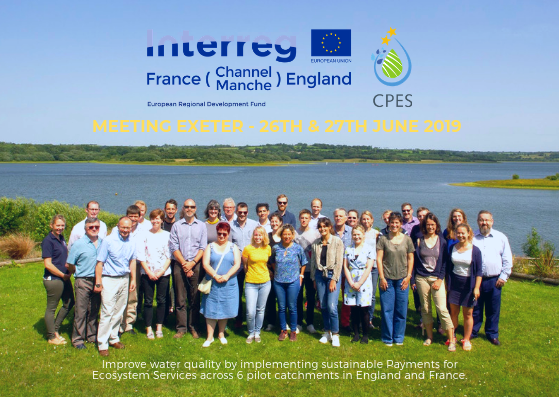The CPES Steering Group Meeting was held in Exeter, Devon, on the 26th and 27th of June.

The morning was spent reviewing the progress of the project and developing strategies to ensure the continuation of the PES Schemes. The rest of the day was spent looking at how the case studies are developing, whether there are synergies between each case study and how differences are complimented in order to achieve a cohesive Pilot. Some of the discussion centred around the use of incentives. It is advisable to ensure that incentives are comparable. They do not need to be identical as each study is different and has different needs, but they must be comparable in order to be seen as a comprehensive pilot.
Visits were made to the Slapton Ley case study and presentations were given by the Environment Agency, Field Studies Council, Natural England and the NFU. These presentations gave differing perspectives on PES Schemes and how farmers can be encouraged through policy, incentives and relationship building. Marine Gratecap spoke for a while on how French studies deal with farm interventions which was followed by an interactive and sometimes challenging altercation between two French Farmers and the audience. One aspect that was interesting from the French Farmers was the need to be heard and how sometimes policy makers do not listen to the problems that Farmers experience on the ground.
The second day was spent looking at the economic implications of the Pilot PES Scheme. The Project aims to identify and publicize how PES schemes can impact on the various stakeholders in mutually beneficial ways. The work that CPES carries out will identify where policy can be changed to accommodate the recommendations ensuring a fair deal is sought for the farmers and water companies to render such schemes sustainable. Thus, it is important to ensure data extraction at a catchment scale to make the results more meaningful. Moreover, there needs to be a complimentary approach to how the economic impacts are assessed to ensure that even though the policy measures may be different in each country, there are consistencies in how these are calculated. As such it was stressed that a common set of indicators be explored for comparing the outcomes of the different pilots.
The two days were finished off with a really informative and fun activity with Jenni Dungait, a soil specialist. Everyone was able to get involved with some soil sample testing showing how you can quite simply tell the difference between ‘good’ soil and ‘poor’ soil. As usual, the main objectives of the meeting – to bring together the activities of the project partners and consolidate, to decide on future activities as a project, to depart energised and motivated – were all achieved and everyone returned home to continue the work.
All pictures of the meeting can be seen on the CPES project Facebook page.


